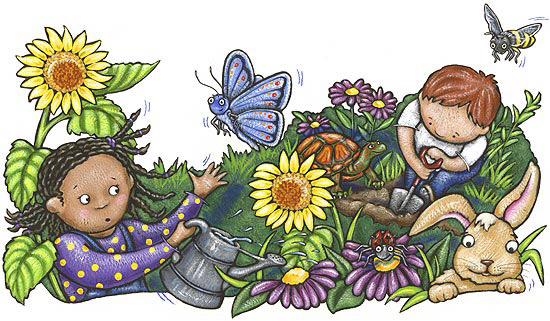Gardening With Kids
We spotted this expression on TLC.HowStuffWorks.com: “Garden activities for kids unlock the magic of growing plants, provide keys to the mysteries of living things, and open the world of beautiful flowers. By sowing seeds or planting gardens, you and your kids can share the wonder of an ever-changing leafy world.”
A garden is the perfect educational platform. For centuries it has inspired poetry, physical activity, conversation, art and many more of the good things in life! We can’t think of a more well rounded classroom for kids.
Many of us have fantasized about working with our kids in the garden, but how can it be achieved? You want young Junior to enjoy gardening as much as you do, but what if he’s just not interested? His short attention span is not that conducive to the time that your flower beds require.
Turn tasks into games. What kid doesn’t want to be pushed around in a wheel barrow? Pick a bouquet of flowers and deliver it to your neighbor. Even weeding is fun if it is placed in the context of a race! Decorate flower pots. Eat the veggies after rinsing them off with the garden hose. Personify the flowers with silly names. There are endless ways to have fun while learning and growing.
Check out this Sunflower Playhouse! Sunflowers grow really tall, really fast, and provide a shady, living structure for your kids.
Do you have a specific landscaping design that needs to be maintained, and that would be compromised by kindergarteners with rakes running willy-nilly every which way? Consider dedicating a certain area to their schemes. If they have the freedom, guided by you of course, to choose which veggies or flowers to grow, and are somewhat responsible to care for that designated square footage, they are a lot more likely to learn and enjoy the process.
Here are a few practical lessons to be learned in your outdoor classroom:
1. What is edible and what is not.
2. The break down of materials in your compost pile.
3. The basic necessities that living things have.
4. How weather conditions affect the plants.
KidsGardening.org points out, “Gardening with your kids or grandkids at home or at a community garden not only provides the tangible benefits of exercise and fresh food, it also fosters communication, builds strong relationships, and offers an opportunity to work towards a common goal.”



